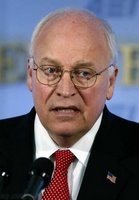 Vice President Dick Cheney AP File Photo
Vice President Dick Cheney AP File PhotoThis story was posted on The Huffington Post, also known as Arianna Huffington's blogsite. Huffington's site found this story off Insight on the News, which is nothing more than a web-based news site from The Washington Times--a Moonie-controlled Republican Party mouthpiece. So I'm not sure how reputable this story is. But you have to wonder how much of this is true--if it is.
So, from Insight on the News:
The role of Vice President Dick Cheney as the administration's point man in security policy appears over, according to administration sources.
Over the last two months Mr. Cheney has been granted decreasing access to the Oval Office, the sources said on the condition of anonymity. The two men still meet, but the close staff work between the president and vice president has ended.
"Cheney's influence has waned not only because of bad chemistry, but because the White House no longer formulates policy," another source said.
"There's nothing to input into. Cheney is smart and knowledgeable, but he as well as Bush are ducking all the time to avoid the bullets."
The sources said the indictment and resignation of Lewis "Scooter" Libby marked the final straw in the deterioration of relations between President Bush and Mr. Cheney. They said Bush aides expect that any trial of Mr. Libby, Mr. Cheney's long-time chief of staff, would open a closet of skeletons regarding such issues as Iraq, the CIA and the conduct of White House aides.
"There's a lack of trust that the president has in Cheney and it's connected with Iraq," a source said.
The sources said Mr. Bush has privately blamed Mr. Cheney and Defense Secretary Donald Rumsfeld for the U.S.-led war in Iraq. They said the president has told his senior aides that the vice president and defense secretary provided misleading assessments on Iraq's weapons of mass destruction, as well as the capabilities of the regime of Saddam Hussein.Defense Secretary Donald Rumsfeld AP File Photo
As a result, the sources said, Mr. Cheney has been ousted from his role as the administration's point man in the area of national security. They said presidential staffers have kept Mr. Cheney out of the loop on discussions on policy as the White House has struggled with the political and intelligence fallout from the war in Iraq.
Mr. Bush is not expected to replace Mr. Cheney unless the vice president follows the fate of his former chief of staff. The sources also said Mr. Rumsfeld is expected to remain in his post until U.S. troops are withdrawn from Iraq.
That's the entire story. Where do I start? Cheney, Rumsfeld, and the rest of the Project for a New American Century (PNAC) people, convinced President Bush to embark on his invasion of Iraq. The invasion and post-war reconstruction was half-hazzardly planned and executed, which certainly resulted in the ongoing insurgency that the U.S. is currently facing in Iraq, today. The continued violence in Iraq, the Valerie Plame and Scooter Libby indictments, have certainly caused Bush's poll numbers to fall. So is it President Bush's fault that he got this country and his presidency into this mess? We all know that President Bush will refuse to admit mistakes. So the president has to blame a scapegoat for this mess--and Vice President Dick Cheney has become that scapegoat.
Of course, pushing Cheney out of the close work in policy formulation with the president is also part damage-control for Bush. With Scooter Libby's trial starting up next year, there is no telling what skeletons remain in the Vice President's closet that could certainly damage Bush. And with President Bush reeling on a number of domestic and foreign policy crisis, the last thing the White House would need is more Valerie Plame scandals coming out of the VP's office--especially if Cheney was directly involved in leaking Valerie Plame's name to the press. There's a couple of other interesting notes in this story. The first is that Bush has privately blamed both Cheney and Rumsfeld for Iraq, as according to the Insight story. And yet, Cheney is the one being ostracize, while Rumsfeld continues working at the Pentagon. Why hasn't President Bush pushed Rumsfeld out as Secretary of Defense? There's also that little quote from the anonymous source, saying that the "White House no longer formulates policy." What does that mean? Is the policy planning for the Iraq war taken out of the White House's control and transferred to the National Security Agency, or the Pentagon? Is Rumsfeld making policy regarding the Iraq war, and President Bush is just following along with whatever Rumsfeld is advising--even though the president may blame Rumsfeld for getting into Iraq in the first place? Finally, what the heck is Cheney doing in the Vice President's office now?
There's a lot of questions here.









No comments:
Post a Comment